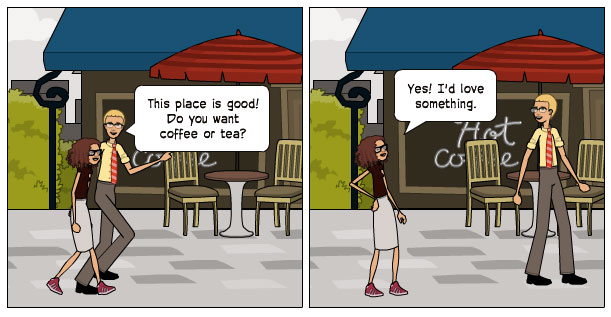Lauren's Linguistics (b)Log
How to request different kinds of information
Disjunction and alternatives in Egyptian Arabic view the pdf
In addition to using language to share information with one another, we also use it to request information from one another. Consider the question in (1). There are two ways to read (1) to request slightly different information. Can you figure out the two ways and how they differ?
- Do you want coffee or tea?
The first way is drawn out in the comic strip below. In this situation, the question in (1) is asked with no pauses and the pitch rise on tea.

With this question, the man in the tie has asks Lindsay if she would like to drink either of these beverages. Likely in an effort to decide whether they should go inside the cafe. The expected answers to this question are something like yes, sure, no, etc. This is called a “polar” or “yes/no” question.
The second way to ask this question is drawn out in the second comic strip. The question in (1) is said with small pause after coffee and the pitch drops on tea. The barista has asked the question in this way to say here are the two options, choose one. This is called an “alternative question”.

What is achieved in English with intonation (differences in pauses and pitch), is achieved in other languages by instead using different words for or. For example, in Egyptian Arabic this question asked with walla (2a) has the choose-one or alternative question interpretation, but the version with aw (2b) has the other yes/no interpretation.
- a. Ayza ahwa walla shai?
- b. Ayza ahwa aw shai?
This difference has repercussions throughout the grammar. The distribution of both walla and aw is more restricted than that of English or. Walla always carries the choose-one meaning, and therefore can only occur in structures where that meaning in appropriate. For example, in a so-called wh-question, as in (3). In English, there is no way to change your pauses and pitch to ask this question in a way that conveys a choose-one interpretation (try it!). There is something about this structure that blocks the choose-one meaning. The equivalent sentence to (3) in Egyptian Arabic (and all wh-question structures) cannot contain walla.
- Who wants coffee or tea?
Likewise, the sentence in (3) must have a choose-one interpretation, and therefore walla could be used in the Egyptian Arabic translational equivalent, but aw cannot.
- Do you want coffee or not?
What can we conclude from this? Do English and Egyptian Arabic just have different words? They are very different languages after all. I claim that Egyptian Arabic gives us a window into the inventory of natural-language meanings. This comes from a view that human languages all share some basic units of meaning which can be mapped onto different symbols (words and morphemes). It seems that there are two different or (disjunction) meanings encoded in languages, and both just happen to be mapped onto the word or in English, obscuring the fact that there are two meanings. But these two meanings are apparent in a language like Egyptian Arabic which assigns them each to two separate words.
(In case you’re wondering, as some do: the distinction is not between exclusive and inclusive disjunction. See paper details.)